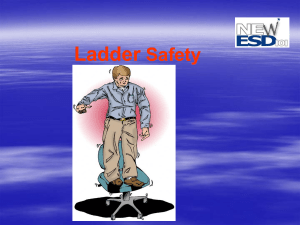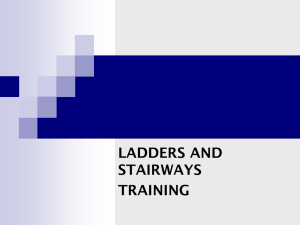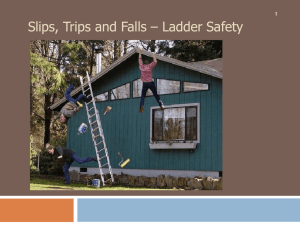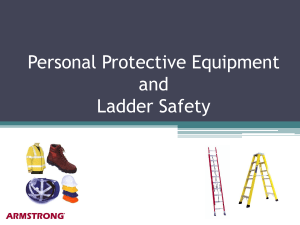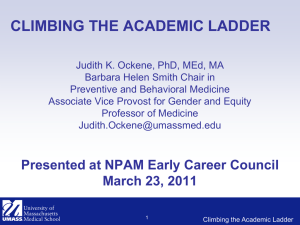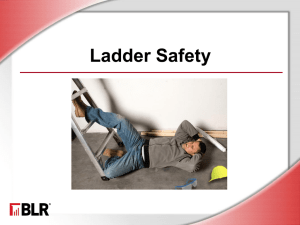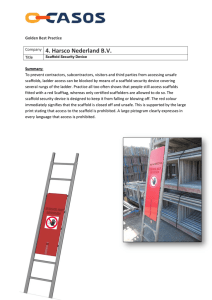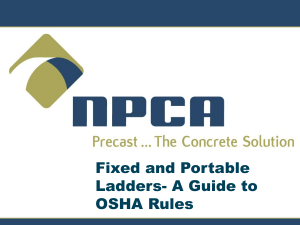Featherlite Safety Presentation ver 11 28 2012
advertisement
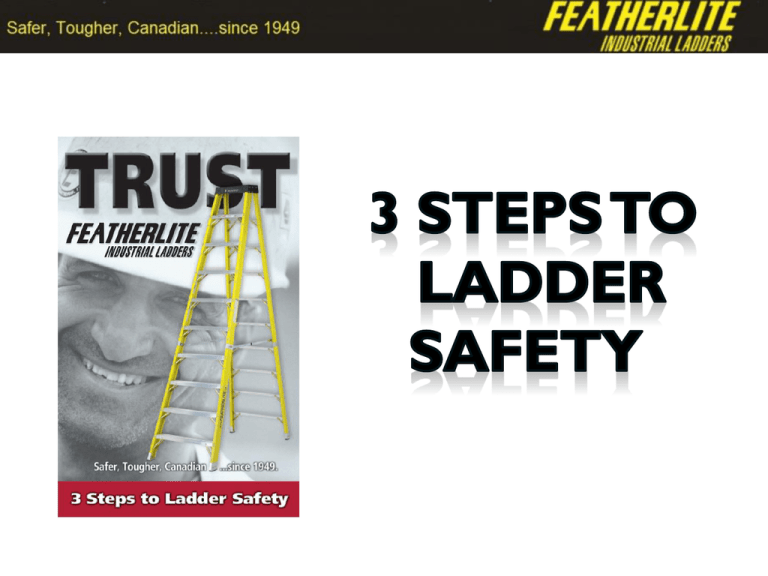
Tens of thousands of people are injured, and hundreds killed in North America every year while using ladders. Our objective today is to reduce YOUR risk of a future ladder incident through education and adoption of a 3-Step Ladder Safety Program, incorporating ladder… Almost all incidents can be traced to the incorrect application or misuse of a ladder. In what environment will the ladder be used? -Working on, or in the vicinity of, live electrical circuits? -In a corrosive atmosphere? -On uneven, severely sloped, or otherwise poor footing? Consider ladders fitted with… -Adjustable leg-levelers when using extension ladders on uneven, highly-sloped surfaces -Combination ladders for use in stairwells Select non-conductive Fibreglass ladders instead -DO NOT use Aluminum… -On, or around, electrical circuits -In highly corrosive environments. - What kind of ladder? …Step, straight, extension, or combination ladder ? - What size of ladder is required to perform the task? - What is the maximum load the ladder must support? (Weight of person + clothes + tools + materials) MAX. LOAD CAPACITY RATED USE CSA ANSI 375 lbs SPECIAL HEAVY DUTY, designed for heavier loads and the most demanding industrial and construction applications GRADE 1AA TYPE 1AA 300 lbs EXTRA HEAVY DUTY, designed for frequent use in maintenance, construction and GRADE 1A TYPE 1A industrial applications 250 lbs 225 lbs 200 lbs HEAVY DUTY INDUSTRIAL, designed for use by contractors, maintenance, construction and industrial applications MEDIUM DUTY COMMERCIAL, designed for moderate use by homeowners, painters, handyman LIGHT DUTY HOUSEHOLD, designed for household chores, cleaning, painting GRADE 1 TYPE 1 GRADE 2 TYPE II GRADE 3 TYPE III Step ladders are designed to be free standing, are available in a variety of sizes ranging from 2’ to 16’. -Used for most typical one-person job applications -A range of lengths from 2’ to 16’ -Available in aluminum and fibreglass Trestle or Two-Way step ladders can be climbed from either side, or support two people on opposite sides. -For use when two persons must access the same work concurrently -One person per side at a time -A range of lengths from 3’ – 16’ -Available in Fibreglass and Aluminum -For repeated/sustained work at same level -Provides maximum user comfort and stability -One person at a time -A range of sizes 4’ – 16’ -Available in fibreglass and aluminum Straight and Extension ladders require both the top and bottom of the ladder to be supported. -Available in a variety of sizes ranging from 8’ to 60’. -Available in aluminum and fibreglass. -A combination of step, straight and extension ladders -Available in 3 types : Articulating , Articulating & Telescoping, and 3-Way -One or more pairs of lockable articulating hinges allow setup in several positions, including : -Stepladder -Straight -Scaffold -Available in 12’ – 16’ -All features of articulating ladders plus independent length adjustment of each side -BEST CHOICE for frequent stairwell work -Available in 12’-23’ lengths -Excellent utility including stairwells - A range of lengths from 6’ – 13’ -Available in both aluminum and fibreglass Aluminum -Extruded shapes to meet specific load requirements. -Moisture resistant -Comparatively light weight. -Conducts heat and electricity and should not be used in areas where the above or highly corrosive conditions exist. Fiberglass -Pultruded shapes of continuous glass fibres and matts encapsulated in plastic res -Used with aluminum steps/rungs to satisfy specific load and strength requiremen -A non-conductor of heat and electricity. -Resists corrosion. -Moisture resistant. Steel -Designed to meet specific load requirements -Easily assembled by welding. -Susceptible to rust and corrosion. -Conducts heat and electricity and should not be used in areas where the above or highly corrosive conditions exist Four-To-One Rule PLACE BASE OF LADDER ONE FOOT OUT FROM WALL OR OVERHANG FOR EVERY 4 FEET OF EXTENDED LADDER LENGTH •ALWAYS INSPECT YOUR LADDER PRIOR TO USE •Metal ladders conduct electricity. Keep away from electrical circuits. •Do not use in high winds or during a storm. •Do not use in poor health, if taking drugs or alcoholic beverages, or if physically handicapped. •Keep bottom of shoes clean. Leather soles should not be worn. •Never leave ladder set up and unattended. •Pay close attention to what you are doing. • Do not overload. Read all labels and follow all instructions. -Never use a step ladder over 16 feet. Proper scaffolding is the correct product. Ladders are not intended to be used as or on scaffolds. -Set all feet on firm, level surface. Do not place on unstable, loose, or slippery surfaces. -Keep body centered between side rails. Do not overreach. Get down and move ladder as needed. -Do not climb, stand, or sit on spreader braces, ladder top, or pail shelf -Do not straddle front and back. Do not climb from one ladder onto another. -Avoid pushing or pulling off to the side of ladder. Do not "walk" or “jump" ladder while on it. -Never use a step ladder as a straight ladder leaning against a wall. -Remove oil, grease, mud or any other foreign substance from hands and shoe soles before climbing. -Never use a ladder on surfaces covered with oil, grease or ice. -Make sure the ladder is placed on an even, hard surface. -Use rubber safety feet on concrete or paved surfaces. Use spiked feet on grass or loose surfaces. -Make sure rung locks are engaged before climbing. There should be only one person on the ladder at a time. Maintain 3 points of contact with the ladder at all times Once the correct ladder for your task has been selected, the ladder should be carefully inspected before each use. Many accidents are caused by the use of unsafe or damaged ladders and can lead to severe injury or death. NEVER USE A DAMAGED LADDER. 1. CRACK A see through separation of fiberglass lamination visible from both sides. The ladder should be removed from service until the rail can be replaced or the ladder disposed of. 2. GOUGE / HOLE A puncture that is visible from both sides. The ladder should be removed from service until the rail can be replaced or the ladder disposed of. 3. RESIN SURFACE CRACK If a surface crack does not penetrate the laminate layer, apply a coating of polyurethane clear-coat or equal. Inspect regularly to ensure it has not expanded. If moisture has penetrated the rail, then the ladder should be replaced. Only a certain number of items that can be repaired in the field. If in doubt check with a Featherlite authorized dealer or a Featherlite representative. The following is a list of the most common parts that can be replaced by a qualified maintenance individual: EXTENSION LADDERS • PROTECTIVE END CAPS • ROPE ASSEMBLY • RUNG LOCKS • SLIDE GUIDES • COG WHEELS • SAFETY FEET • RIVETED RUNGS STEP LADDERS • • • • • SAFETY SHOES ROPE ASSEMBLY SPREADER ARMS HEAD-TRAY PAIL-TRAY LADDER INSPECTION FORM INSPECTOR_____________ DATE___________ IDENTIFICATION #____________ STORAGE LOCATION___________ DATE RECEIVED ____________ MODEL #_______________ GENERAL ITEMS DAMAGED /MISSING TYPE OF LADDER_________________ SIZE OF LADDER_________________ TYPE OF MATERIAL________________ WORN OK N/A NOTES RAILS RUNGS / STEPS FASTENERS FEET STEP LADDERS TOP CAP SPREADER ARMS HORIZONTAL BRACES DIAGONAL BRACES OTHER: EXTENSIONS LADDERS END CAPS ROPE AND PULLEY RUNG LOCKS SLIDE GUIDES OTHER: DISPOSITION: REMOVE FROM SERVICE AND DESTROY REMOVE FROM SERVICE AND REPAIR [REPAIR DUE DATE _________________ ] OK TO RETURN TO SERVICE Regular maintenance and inspection of your ladders will keep them working safely.The following is a sample of a Featherlite Ladder audit. Inspect every ladder in the fleet, regardless of the manufacturer. Using the information gathered the ladders will be categorized into 4 main categories ; -DISCARD .... Ladders which are below the duty rating agreed on with the customer; and, ladders which are beyond repair. -TAG FOR REPAIR .... Using approved ladder replacement parts -APPROVE ..... Ladders that are OK as is ( regardless of manufacturer) -REPLACE ... All discarded ladders with new ladders within the agreed customer parameters. Ladder # Review or Mill Region/Dept DQ Manufacturer •Style S 101 * Steel Yard Allright Step S 102 DQ Steel Yard Featherlite Step S 103 * Steel Yard Featherlite S 104 Steel Yard S 105 Type 1 250 lb Type 1A 300 lb Type 1AA 375 lb ** Material Length Comments (ft) Wd 12 Back brace broken, wet, label 1A Al 8 4408 Mfg 12 97 Btm L. Rail bent,Step profile at risk Step 1A Al 10 4410 Mfg 10 98, Pail Tray removed, Labels Featherlite Step 1A FG 10 6410 Mfg 08 06 Steel Yard Allright Step Wd 6 Wet S 106 Steel Yard Featherlite Step 1A FG 6 6906 Mfg 10 08 S 107 * Steel Yard Featherlite Step 1A Al 6 4406, Left Rail bent, Step bent, Pail tray removed S 108 DQ Steel Yard Reynolds Extension Al 40 3984 14 Bent rungs, Label S 109 DQ Steel Yard Reynolds Extension Al 36 Weld holes in rung, rung missing, No rope S 110 * Steel Yard Featherlite Extension Al 24 4224 Rope missing, some rung dents S 111 Steel Yard Allright Step Wd 7 Pail tray missing, wet 1A Ladder # Review or Mill Region/Dept DQ Manufacturer •Style S 111 Steel Yard Allright Step S 112 Steel Yard Featherlite Step S 113 Steel Yard Featherlite S 114 Steel Yard S 115 Type 1 250 lb Type 1A 300 lb Type 1AA 375 lb ** Material Length Comments (ft) Wd 7 Pail tray missing, wet 1AA FG 8 6808-AA New 07 11 Extension 1A Al 20 3220D New 03 11 Featherlite Extension 1A Al 16 3216D New 03 11 Steel Yard Featherlite Extension 1A Al 20 3220D New 11 11 S 116 Steel Yard Featherlite Extension 1A Al 28 3228D New 08 11 S 117 Steel Yard Featherlite Extension 1A Al 28 3228D 10 11 S 118 Shop Featherlite Step 1A FG 4 6904 New 11 11 S 119 Shop Featherlite Step 1AA FG 6 6806-AA New 12 11 S 120 Shop Featherlite Step 1AA FG 8 6808-AA New 02 11 S 121 Tool Crib Featherlite Step 1A Al 3 3403 08 08 Style Material Qty Review or DQ Steps Wood 3 1 Aluminum 4 3 Fibreglass 6 Aluminum 8 3 Total 21 7 Extension FEATHERLITE LADDERS SAFTEY TRAINING BOOKLET FEATHERLITE LADDERS http://featherliteladders.com/ FEATHERLITE MOBILE SITE http://featherlite.kkpc.mobi/home/ WORK SAFE BC http://www.worksafebc.com/ AMERICAN LADDER INSTITUTE http://www.americanladderinstitute.org/
